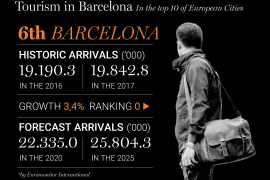
On October 28th at 3 o'clock a.m. we rewinded the...

CosmoCaixa commemorates the half century of the arrival to the...

You would never say that Mari Carmen Tous is 85...

In Barcelona, a city which has, unfortunately, recovered its attraction...

Rents increase 9% due to competitive pressure and reach 3,000...

2017 saw the consolidation of three trends: larger rounds of...

“Science is alive and it’s part of culture. Science is...

We are beginning to take in that it is possible...

From the Sociedad Catalana para el Alumbrado por Gas, founded...
Until you become an expert driver, you have to realise...

Como bien nos recordaba Irene Vallejo en su Manifiesto por...

Música clásica sobre la arena de la playa en dos...

The first session of the cycle on the regatta organized...

The hospital's managing director, Manel del Castillo, and the pharmaceutical...

Generalitat y Ayuntamiento impulsarán dos equipamientos de 'Casa de les...

Leticia Beleta, director of Alexion Pharmaceuticals in Spain and Portugal,...

We all have a friend who never leaves the Gràcia...

Barcelona director opts for Best International Film with 'La sociedad...

The hotel and industrial sectors softened the market's decline last...

The technology company, with a workforce of 35 employees and...

[dropcap letter=”W”]
hile the first half of the 20th century was determined by a long civil war spanning three decades, the Europe that emerged from 1945 resulted from a peculiar paradox: on the one hand, Great Britain and France had managed to keep the frontiers of their empires intact; on the other, their weakness was unquestionable. We should not forget that the process of communitary integration stems from the vulnerability of the continent and the fear of nationalisms. Poverty became the visible sign of those years. According to the economist Barry Eichengreen, “in 1950, many Europeans heated their homes with coal, froze their food with ice and depended on rudimentary forms of interior plumbing, to put it nicely”. These signs, certainly, revealed that there was an old world within a changing context. However, the second half of the 20th century transformed completely the face of Western Europe. In 1957, France, the Federal Republic of Germany, Italy and the Netherlands signed the Treaties of Rome and, although —as Tony Judt holds— we should not exaggerate the importance of these agreements, the Treaties of Rome succeeded in promoting international cooperation to such an extent that its creation and development became inevitable. The long period of internal peace, its favourable demography, the increase in productivity, the welfare state and the political consensus constitute the golden age of European prosperity. This long cycle comes to a grinding half at the end of the 80s, as Europe became a society of middle classes that standardized access to such assets as having a car or owning a house, traditionally associated to the bourgeoisie or higher classes. The strength of public policies facilitated a generous social agreement that would consolidate the upward trend of economy and standards of living of the European.
The liberal consensus had succeeded, as had the new model of capitalist development. And, being reasonable —despite the objections and inconveniences of new populisms and the return to political sentimentality—, Fukuyama’s central thesis still holds true
The Fall of the Berlin Wall in 1989 became the logical corollary to the history of the two Europes emerging from the post-war. It was in that year that Francis Fukuyama wrote his famous article “The end of history”, subsequently followed by his equally famous book published in 1992. The liberal consensus had succeeded, as had the new model of capitalist development. And, being reasonable —despite the objections and inconveniences of new populisms and the return to political sentimentality—, Fukuyama’s central thesis still holds true. Despite its many nuances, the framework that enables the solution to intricate problems still demands a free market, commercial openness, legal security, social protection and democratic rights. But 1989 involved much more than the fall of real socialism, as the consolidation of the real revolution of the last thirty years had just begun: the awakening of China and its irruption in the wheel of globalizations. From the European perspective, this leap forward offered distinctive traits after decades of development. The Euro was launched and the free circulation of workers, goods and services accelerated the construction of a great unique market. However, as Tony Judt points out in his influential work on the European post-war, “things would never be what they used to be, when the periods of economic prosperity tended to give the disadvantaged better-paid and safer jobs. In other words, Europe was creating a marginalized class amidst bonanza”.
The 2008 crash aggravated ongoing old tensions. Ageing of the population and rising public and private debt level, stagnation in productivity and structural unemployment overshadowed, all of a sudden, the successful story about the Union. After thirty years of unquestionable progress plus thirty years keeping up the welfare state, the shadow of populisms was looming on the horizon, and reached its climax with the Brexit. However, the main threat is posed by social fragmentation which, despite drafting a new intelligent geography, at the same time, divides citizens into apocalyptic and supporters. This division establishes a framework which deteriorates the expectations of both middle class and workers and questions the validity of political elites. Spearheading a profound European scepticism is essay writer Pierre Manent, who has warned against the danger of a Ciceronian moment for Europe, wavering between a desire of greater integration and the temptation to re-nationalize sovereignty. Before this dilemma, the future of the EU must undergo reforms that allow adapting community institutions to new current challenges and guarantees its capacity to mitigate social unrest, improve the standard of living of its inhabitants and provide better opportunities for the future. This would become the main asset of reasonable politics in a scenario of deep structural transformations. Certainly, not much different from the original desire of a shared and better Europe, born in Rome sixty years ago.

[dropcap letter=”W”]
hile the first half of the 20th century was determined by a long civil war spanning three decades, the Europe that emerged from 1945 resulted from a peculiar paradox: on the one hand, Great Britain and France had managed to keep the frontiers of their empires intact; on the other, their weakness was unquestionable. We should not forget that the process of communitary integration stems from the vulnerability of the continent and the fear of nationalisms. Poverty became the visible sign of those years. According to the economist Barry Eichengreen, “in 1950, many Europeans heated their homes with coal, froze their food with ice and depended on rudimentary forms of interior plumbing, to put it nicely”. These signs, certainly, revealed that there was an old world within a changing context. However, the second half of the 20th century transformed completely the face of Western Europe. In 1957, France, the Federal Republic of Germany, Italy and the Netherlands signed the Treaties of Rome and, although —as Tony Judt holds— we should not exaggerate the importance of these agreements, the Treaties of Rome succeeded in promoting international cooperation to such an extent that its creation and development became inevitable. The long period of internal peace, its favourable demography, the increase in productivity, the welfare state and the political consensus constitute the golden age of European prosperity. This long cycle comes to a grinding half at the end of the 80s, as Europe became a society of middle classes that standardized access to such assets as having a car or owning a house, traditionally associated to the bourgeoisie or higher classes. The strength of public policies facilitated a generous social agreement that would consolidate the upward trend of economy and standards of living of the European.
The liberal consensus had succeeded, as had the new model of capitalist development. And, being reasonable —despite the objections and inconveniences of new populisms and the return to political sentimentality—, Fukuyama’s central thesis still holds true
The Fall of the Berlin Wall in 1989 became the logical corollary to the history of the two Europes emerging from the post-war. It was in that year that Francis Fukuyama wrote his famous article “The end of history”, subsequently followed by his equally famous book published in 1992. The liberal consensus had succeeded, as had the new model of capitalist development. And, being reasonable —despite the objections and inconveniences of new populisms and the return to political sentimentality—, Fukuyama’s central thesis still holds true. Despite its many nuances, the framework that enables the solution to intricate problems still demands a free market, commercial openness, legal security, social protection and democratic rights. But 1989 involved much more than the fall of real socialism, as the consolidation of the real revolution of the last thirty years had just begun: the awakening of China and its irruption in the wheel of globalizations. From the European perspective, this leap forward offered distinctive traits after decades of development. The Euro was launched and the free circulation of workers, goods and services accelerated the construction of a great unique market. However, as Tony Judt points out in his influential work on the European post-war, “things would never be what they used to be, when the periods of economic prosperity tended to give the disadvantaged better-paid and safer jobs. In other words, Europe was creating a marginalized class amidst bonanza”.
The 2008 crash aggravated ongoing old tensions. Ageing of the population and rising public and private debt level, stagnation in productivity and structural unemployment overshadowed, all of a sudden, the successful story about the Union. After thirty years of unquestionable progress plus thirty years keeping up the welfare state, the shadow of populisms was looming on the horizon, and reached its climax with the Brexit. However, the main threat is posed by social fragmentation which, despite drafting a new intelligent geography, at the same time, divides citizens into apocalyptic and supporters. This division establishes a framework which deteriorates the expectations of both middle class and workers and questions the validity of political elites. Spearheading a profound European scepticism is essay writer Pierre Manent, who has warned against the danger of a Ciceronian moment for Europe, wavering between a desire of greater integration and the temptation to re-nationalize sovereignty. Before this dilemma, the future of the EU must undergo reforms that allow adapting community institutions to new current challenges and guarantees its capacity to mitigate social unrest, improve the standard of living of its inhabitants and provide better opportunities for the future. This would become the main asset of reasonable politics in a scenario of deep structural transformations. Certainly, not much different from the original desire of a shared and better Europe, born in Rome sixty years ago.
